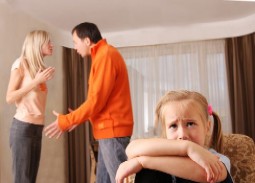Studies tell us that those with kids are less happy than those without. They tell us that mothers are less happy than fathers, that single parents are less happy still, that babies and toddlers are the hardest, and that each successive child produces diminishing returns. Still others say…
…parents are more depressed than nonparents whether they’re single or married, whether they have one child or more. So why do parents say they are happy when the data say otherwise? New York Times Magazine’s “All Joy No Fun: Why Parents Hate Parenting ” by Jennifer Senior discusses why.
Daniel Gilbert, the Harvard psychologist and host of This Emotional Life on PBS, and author of Stumbling on Happiness thinks it’s because parents delude themselves into thinking it will make them happy. We have pronatalistic beliefs and values than run our society to thank for that.
But the reality is when the babies hit, satisfaction takes a hit. Psychologists W. Keith Campbell and Jean Twenge not only found that couples’ overall marital satisfaction went down if they had kids, but that parents’ dissatisfaction “only grew the more money they had, even though they had the purchasing power to buy more child care.” Why? Twenge thinks it’s because they become parents later in life. Because you lived without them for longer, you know more about what you gave up. And waiting longer parents tend to romanticize what parenthood will be like, and when it lands in their life, they have a rude awakening.
The marriage also suffers. Satisfaction declines in cycles. It decreases when the baby is born, rises between the kids’ ages six and twelve, then dives again when the kids hit their teens. Disagreements increase, especially about the kids, the guy often feels neglected and experiences his wife as more demanding.
Why else would parenthood affect happiness? Senior talks about how children are long past being needed (pre urbanization) to now being a huge expense, and more like “projects to be perfected.” The kind of “concerted cultivation” this takes is a lot of work.
Alex Barzvi, a professor of child and adolescent psychiatry at NYU medical school contends that parents these days spend lots of energy comparing themselves to other parents, their kids with others’ kids, and often concluding they’re doing the wrong thing. Indeed, getting caught up in this kind of self-judgment and criticism does not foster feelings of happiness.
And while having kids can deepen one’s emotional life, it also shrinks “your outer world to the size of a teacup, at least for awhile.”
But it isn’t that bad for all parents. Interestingly, countries that have stronger social systems–paid maternity and paternity leave, subsidized childcare and free education and healthcare — “produce happier parents.” These countries make parenting easier, and easier parenting makes for happier parents.
But better social systems aren’t the key to happy parents. As Senior puts it, “purpose is happiness.” The process of parenting may not make parents happy these days, but being parents in the big picture–feeling an overall sense of meaning and reward from parenting, is the happiness parents are talking about when they say they are happy.
But as the childfree know, parenthood is certainly not the only way to find meaning and purpose, thus happiness in life. It is just ONE way.
What gives YOU you meaning and purpose in life? Let’s hear from you–!


